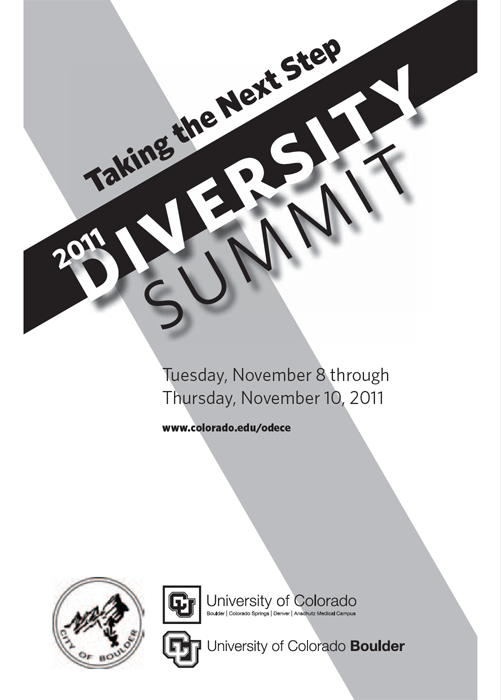Diversity discussion: Higher ed too focused on ‘fixing’ students
The world is demanding more of students as workplaces become more complex, and institutions of higher education must rise to the challenge by working collaboratively to enact bold changes, said Alma Clayton-Pederson, who gave the keynote address Tuesday at the 17th annual Diversity Summit at the University of Colorado Boulder.
Clayton-Pederson, senior scholar at the Association of American Colleges and Universities, kicked off the three-day event Tuesday morning in the Glenn Miller Ballroom at the University Memorial Center with a conversation about inequities in the education system and the steps needed to remedy the issues in order to maintain the nation’s high ideals and economic vitality.
“The challenges we face … are many,” she said, and that helps make a case for why diversity, equity and inclusion are important. “If in fact the work we had been doing for the last 60 years had truly been revolutionary, evolutionary and transformational, I don’t think we would have to continue in the same way that we’ve been doing for the last two decades.”
Bold changes are needed to help people be the best they can be, she said. A majority of employers report that graduates don’t have the skills for entry-level positions in this evolving, demanding environment. Part of the problem is that multiple school systems don’t agree on common core standards, which do not include “arts and music, the things that … allow us to get outside ourselves and think about the world. Without those things, we are promoting a pedagogy of poverty. If all people can do is technology, they’re missing the part of being able to interact with people and being able to think deeply beyond the technical.”
In higher education, said Clayton-Pederson, what is done to address equity, inclusion and diversity is focused on “fixing” the students. While support programs are fabulous, they often are targeted to specific groups, she said, but all students need some help some time. Support needs to be provided based on what the students need.
Albert Einstein, who said he was bored in school, was able to maintain his curiosity, she said, but the nation’s current education system “stamps (curiosity) out in middle school.” By the time students get to the university level, all they want is a professor to give them answers and tell them what to study so they can get a good grade in the course. “If we continue down this path, we will fail as a nation.”
In addition, she told the crowd of about 130, colleges and universities need to create an environment where everyone is thriving, including faculty and community, in order to tap the diversity and richness that is there. “Experiences make you who you are,” she said. “There’s concern, and rightly so, that when we start talking about diversity, that there’s a fear we’re talking about color-blind. It’s not about having someone who is different in your department, or recognizing that people with disabilities also are smart, it’s about intentionally engaging (diversity) for the richness it provides.”
Change also needs to move beyond the classroom. Success is not just about developing intellectual skills but also about developing personal and social responsibility, she said. This is important because “the role models that they have in our Congress are not the ones we want (students) to have. Where we can’t talk civilly about the challenges the nation faces because we’re too intent on getting re-elected,” she said to applause from some members of the audience.
True change begins with support and building an infrastructure for learning, Clayton-Pedersen said. Building knowledge capacity is essential, she said, as is using data to help explain the challenges the nation faces. “We have to use data to help explain the challenges that we face, and understand the experience of various groups to help them excel,” but often data sits on a shelf in the chancellor’s office or is not presented in a useful way.
While everyone in institutions and communities need to participate to bring about change, even though it may take more work in the beginning, having support also is essential. So is building an infrastructure for learning, she said. “If you don’t have an infrastructure that matches the beliefs and values you have, how do you expect it to move forward? How do you expect to take the next step? How do you expect the journey to be any different than the journey you’ve been on for the last 20 years?”
Smaller workshops throughout the day focused on different aspects of diversity, from building community to understanding where “isms” come from to understanding identity development.
In one session, titled “For Anyone Who Has Ever Been Embarrassed by Their Own Thoughts about Race and Ethnicity,” participants learned that messages often are generational and cultural, taken from bits of information that are connected together. Many times, however, false connections occur over and over and become an automatic association that often overrides facts.
The session, presented by Glenda Russell and Andrea Iglesias of Counseling and Psychological Services, also offered advice on how to break through those false connections and change thinking patterns.
“Taking the Next Step” summit was sponsored by the Office of Diversity, Equity and Community Engagement, the CU System Diversity Office, Chancellor’s Advisory Committees and the city of Boulder.


